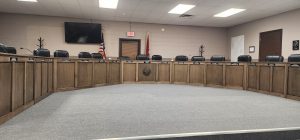 LACIE SILVA – Editor
LACIE SILVA – Editor
The County Commissioners board convened November 7, for a workshop focused on delving into the details of the “County Powers Act Resolution.”
The primary goal of the meeting was to address lingering questions and seek clarification before reaching a final decision on the matter at the upcoming commissioner meeting. In attendance were Commissioners David Abbott, Don Adkins, Ruric Brandt, Logan Campbell, Jimmy Cantrell, Steven Franklin, Gene Hargis, Chris Morrison, Jim Nunley, Paul Schafer, Peggy Thompson, and Sherry VanAllman. Chairwoman Linda Mason, Attorney William Gouger, and Mayor David Jackson also attended. Absent were Commissioners Donald Blansett and Dennis Rollins.
As previously detailed, the “County Powers Act Resolution” comprises five sections that, if passed by a 2/3 majority, grant the county the authority to exercise powers typically granted to municipalities. These powers include defining, prohibiting, abating, suppressing, preventing, and regulating various activities for the well-being of the community. The act emphasizes the need for a 2/3 majority for both the authorization and any regulations to be enacted under this resolution. The regulations aim to address practices detrimental to the health, morals, safety, convenience, and welfare of the inhabitants, as well as prescribe limits for lawful establishment and maintenance of businesses and practices. A sample of the resolution can be found at https://www.ctas.tennessee.edu/sample-county-powers-act -resolution.
 Several petitions were submitted to the board, but many were in the form of emails lacking names and physical signatures. Mason returned these papers. Gouger clarified that for the petitions to be part of the public record, they must be submitted during a meeting with recorded minutes. Workshops, where this submission occurred, don’t record minutes and lack a public comments section. Gouger noted that despite lacking signatures, emails could still be submitted, though those with physical signatures and names would hold more weight.
Several petitions were submitted to the board, but many were in the form of emails lacking names and physical signatures. Mason returned these papers. Gouger clarified that for the petitions to be part of the public record, they must be submitted during a meeting with recorded minutes. Workshops, where this submission occurred, don’t record minutes and lack a public comments section. Gouger noted that despite lacking signatures, emails could still be submitted, though those with physical signatures and names would hold more weight.
Brandt opened the discussion by addressing concerns that the special powers act has the potential to cause more issues, but he expressed his belief that it is the only tool the board has to regulate sand plants in support of the people of Marion.
Gouger provided guidance for commissioners seeking ways to control or regulate property usage, suggesting three resources: First, a county-wide zoning plan submitted as a comprehensive outline; Second, opting into the powers act and adopting regulations (requiring a 2/3 majority for approval); Third, depending on the nature of the “nuisance” definition, counties may file a lawsuit to abate the nuisance, citing an example in Chattanooga where a motel was sued and shut down due to perceived nuisance caused by the homeless population it attracted.
Brandt raised a hypothetical scenario, expressing concern about potential property damage from a sand plant near his property. He emphasized the need for protection if water or riparian rights are compromised. Brandt acknowledged citizens’ worries about water contamination from blasting and ammonia nitrate byproducts. While not happy with the special powers act, he pointed out the limitations on targeting specific companies. Brandt suggested using a nuisance act to address concerns and referred to information from the Tennessee Farm Bureau Federation regarding agriculture. He highlighted the vagueness of regulations against agricultural activities and the restrictions on county government in regulating such activities.
 Brandt read the following: Farm Property for property tax purposes is defined in Tennessee Law in 67‐5‐501 as the following “‘Farm property’ includes all real property that is used, or held for use, in agriculture as defined in §§1‐3‐105 and 43‐1‐113*, including, but not limited to, growing crops, pastures, orchards, nurseries, plants, trees, timber, raising livestock or poultry, or the production of raw dairy products, and acreage used for recreational purposes by clubs, including golf course playing hole improvements.”
Brandt read the following: Farm Property for property tax purposes is defined in Tennessee Law in 67‐5‐501 as the following “‘Farm property’ includes all real property that is used, or held for use, in agriculture as defined in §§1‐3‐105 and 43‐1‐113*, including, but not limited to, growing crops, pastures, orchards, nurseries, plants, trees, timber, raising livestock or poultry, or the production of raw dairy products, and acreage used for recreational purposes by clubs, including golf course playing hole improvements.”
Gouger addressed the property rights aspect, delving into the classifications of nuisance. He distinguished between public and private nuisances, emphasizing that cities and counties have limited scope in handling public nuisances. Regarding Brandt’s hypothetical scenario of a private property owner causing damage to another’s property, Gouger explained that the damaged party could pursue a cause of action suit for a private nuisance. He highlighted the similarity of this course of action to approaches taken in other counties and states.
Schafer expressed concerns about the roads leading to the proposed work area, questioning their capacity to handle the weight of trucks and the added load of products. He cited examples, including his home area, to illustrate deteriorating conditions such as potholes and cracks. Gouger clarified that the specific road in question, state highway 156, is owned and maintained by the state’s Department of Transportation. He admitted a lack of information on the road’s initial construction standards. Emphasizing that the main impacted roads would be state-owned, Gouger addressed Schafer’s concerns. Schafer sought confirmation that no county roads would be affected, however, Gouger clarified that while he couldn’t guarantee no county roads would be used, the primary traffic would use state roads.
Brandt urged the board to empathize with property owners, asking them to imagine the situation happening to land that had been in their families for generations. He prompted reflection on how they would feel and what support they would desire from the county in such a scenario.
Mason urged board members to consider the opinions of the people in their respective districts when voting. Cantrell emphasized that their decisions impact the entire county, not just their districts. Brandt highlighted the persistent nature of the issue, stating that it won’t go away, and other companies will likely enter the area. He expressed reluctance to zone the county and reasserted that the special powers act may be their only effective tool. Brandt also emphasized the inevitability of the issue affecting other districts in the future.
Gouger clarified that under the County Powers Act, the county has the authority to establish regulations for property usage but cannot outright prevent or prohibit such usage. He emphasized the distinction between the County Powers Act, nuisance act, and zoning actions. The key difference lies in zoning, which allows the county to both regulate and prevent specific types of property use. On the other hand, the County Powers Act enables regulation but lacks the authority to prevent specific uses. Furthermore, Gouger recommended that if the board proceeds with regulations under the County Powers Act, they should invest ample time to ensure the regulations are detailed, specific, comprehensive, and fair.
Adkins inquired if a distance of 5,000 feet would be considered reasonable, and Gouger responded that there isn’t a significant precedent to guide them. He expressed curiosity about the decision of the court of county appeals based on the Grundy County case, where regulations are seeking a 5,000 feet distance from property line to property line. Gouger indicated his interest in finding out whether this distance would be deemed reasonable or dismissed as unreasonable. He referred to a $100 permit fee, mentioned at the October meeting, emphasizing that such matters require careful consideration and planning.
Furthermore, Adkins advised his understanding that the act would not prevent the purchase of the property and asked if it would prevent the issuance of a permit. Gouger clarified that the act wouldn’t stop either, but the impact on a purchaser’s decision regarding which property to buy or seek permits for would depend on their reaction to these regulations.
Schafer asked about the future of the property after sand mining operations were to cease. Gouger clarified that state and federal regulations stipulate post-mining requirements tied to the issued permit. Property owners are obligated to implement reclamation measures, restoring the property to a condition acceptable to the permit agency. These regulations apply universally to activities like coal mining, rock quarries, or sand mining. The efficacy of these measures could persist for years, contingent on the duration of the quarry’s operation. Hargis asked about the authority issuing permits and on what level. Gouger clarified that permits are issued by either the state or federal government, depending on the specific requirements of the permit being sought. Additionally, Gouger noted that surface mining has a precise definition, and sand is explicitly excluded from mineral mining. Consequently, sand is not protected and can be regulated under the act. However, it would not be taxed as minerals according to the same definition.
Brandt asked about the possibility of bankruptcy and whether a bond is in place. Gouger clarified that typically, bonds are implemented to offer financial support for the property in case of bankruptcy. Adkins further inquired about the liability the county might face if the property owner decides to take legal action against the county for the regulations. Gouger mentioned that the property owner could file a civil suit against the county, seeking compensation for interference with property usage. Regarding enforcement after the fact of regulations, Gouger explained that recourse and enforcement are limited in scope. However, regulations can include enforcement measures as a deterrent for potential offenders.
While no vote could be taken during the workshop, the board had the chance to independently consider the information discussed and reach a decision before the November 27, County Commissioner meeting at 6 p.m. The official vote scheduled failed to pass with the 2/3 majority necessary. See next week’s article for the final discussion and vote on the County Power’s Act and the effect on the sand plants.
The Marion Tribune – November 30, 2023








